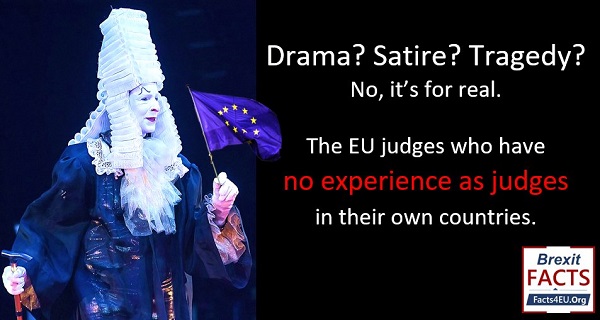ECJ judges can judge UK citizens, with no experience judging in their own countries
Facts4EU.Org reveals the extraordinary facts around the EU’s ‘final arbiter’ of the law

Montage © Facts4EU.Org 2021
Here is the ECJ - imposer of existing and future EU law on UK citizens in Northern Ireland
Yesterday a No.10 spokesman commented after the first week of new talks between the UK and the EU on the Northern Ireland Protocol. Downing Street made it clear that the European Court of Justice must no longer be the final arbiter on the law in Northern Ireland – a supposedly sovereign part of the United Kingdom.
In this Sunday report, Facts4EU.Org lifts the veil over the world of those who sit in Luxembourg, deciding the fate of 440m EU citizens and on the citizens of Northern Ireland.
Former MPs, MEPs, academics, and government advisers – Europhiles all
Brexit Facts4EU.Org Summary
- EU judges at the ECJ are appointed by the governments of the 27 member countries
- They are not required to have had experience as judges in their own countries
- Many are former politicians and academics
- They have spent their careers in the EU federalist environment
- Once appointed, they can only be fired by their fellow judges
- They elect their own presidents, vice-presidents, and top advocates
- They have created ‘EU law’ which has no basis in the EU treaties
Judging the EU’s judges – some examples
Below we show some examples of the judges who preside at the Court of Justice of the European Union (ECJ), based in the tiny EU country of Luxembourg. We must state that all the judges we looked at are clearly intelligent people and most have impressive academic qualifications. This does not, however, equate to years of experience applying the law in courtrooms, before they were appointed to the ECJ.
Koen Lenaerts
President of the Court of Justice
Belgian - No previous experience as a judge in Belgium
Lars Bay Larsen
Vice-President of the Court of Justice
Danish - Three years’ experience as a judge in Denmark
Alexandra (Sacha) Prechal
President of the Second Chamber
Czech (but has mostly lived in Netherlands) - No experience as a judge in either Czech Republic or Netherlands
Constantinos Lycourgos
President of the Fourth Chamber
Cypriot - No experience as a judge in Cyprus
Eugene Regan
President of the Fifth Chamber
Irish - No experience as a judge in Ireland
Maciej Szpunar
First Advocate General
Polish - No experience as a judge in Poland
Siniša Rodin
President of the Ninth Chamber
Croatian - No experience as a judge in Croatia
François Biltgen
Judge
Luxembourger - No experience as a judge in Luxembourg
NOTE: The above is only a selection. Lack of funding prevented us from doing a complete list.
These judges can invent EU law and fundamental principles, with no political oversight
Readers will be aware of the massive schism over Poland which is currently fragmenting the EU and dividing its member countries. Facts4EU.Org reported on this most recently here.
This fight is over the principle of whether the EU is a bloc of sovereign national countries, or an increasingly federalised, wannabe superstate.
The EU treaties contain no provision for the supremacy of EU law over the sovereignty of a member country’s constitution. This was attempted by the EU over 15 years ago when it drafted its failed ‘EU Constitution’, but this was subsequently rejected by those countries whose governments gave the people a referendum on the issue. (The UK government was not one of these.)
As a result, the Lisbon Treaty was born – a re-branding of the abortive ‘EU Constitution’, but without the contentious legal clauses giving the EU supremacy over a country’s constitutional status. This did not stop the ECJ, however, from bypassing the democratic process and from subsequently asserting this right.
The basics about the EU’s top court – the ECJ
The Court of Justice of the European Union (CJEU, more commonly known as the ECJ) is one of the EU’s seven institutions. It consists of two courts of law: the Court of Justice proper and the General Court.

The courts “ensure the correct interpretation and application of primary and secondary EU law in the EU. They review the legality of acts of the EU institutions and decide whether Member States have fulfilled their obligations under primary and secondary law. The Court of Justice also provides interpretations of EU law when so requested by national judges.”
Judges and advocates-general are appointed by each of the governments of the member countries, according to Article 255 of the EU Treaty (TFEU). They serve for six years, renewable by the Court, and are immune from prosecution themselves.
Observations
The ECJ is a politicised court
Put simply, the ECJ is a politicised court. It is populated by those who have lived in the EU federalist world for decades - as politicians, as academics, and as advisers to their national governments on integration.
Yes, they all have legal experience and are undoubtedly very bright, (or even the EU would not be able to accept them), but many have had no experience in their own countries 'sitting on the bench'. It might be expected that to be an ECJ judge one might be expected to have risen to the High Court or Supreme Court in one's home country. Not only is this not true in the case of the majority of judges we looked at but most do not even seem to have experience of sitting on the bench in a Magistrates Court.
And yet these are the people whom the EU Commission claim must be the sole arbiters of the law, in Northern Ireland, and in Poland and all other EU countries.
We trust that the above information will put further backbone into Boris Johnson in insisting that the ECJ must play no further role as arbiter of the law in a sovereign part of the United Kingdom.
Facts4EU.Org badly needs you today
We are a 'not for profit' team (we make a loss) and any donation goes towards the actual work, not plush London offices, lunch or taxi expenses, or other luxuries of some organisations.
We badly need more of our thousands of readers to donate. Could this be you, today? Maybe you've been thinking about it, but just haven't got around to doing it? If so, let us reassure you. It's quick and easy and we use two highly secure payment providers. And we do NOT ask you for further donations if you donate once - we just hope that you keep supporting us. Your donation stays anonymous unless you tell us otherwise.
Please don't assume that other people will keep us going - we don't receive enough to survive and we need your help today. Could you help us?
Most of our readers are well-informed and appreciate our fact-based articles, presented in a way you won't see anywhere else. If you value reports like the one above, please help our work with a donation. We have far more to do in researching, publishing, campaigning and lobbying Parliament than we have in terms of the financial resources to fulfil these tasks. We badly need funding to continue - we rely 100% on public donations from readers like you.
If you believe in a fully-free, independent, and sovereign United Kingdom, please make a donation now. It’s quick, secure, and confidential, and you can use one of the links below or you can use our Donations page here. You will receive a personal, friendly ‘thank you’ from a member of our team within 24 hours. Thank you for reading this.
[ Sources: CJEU | EU Commission | EU Parliament ] Politicians and journalists can contact us for details, as ever.
Brexit Facts4EU.Org, Sun 24 Oct 2021
Click here to go to our news headlines
Please scroll down to COMMENT on the above article.
And don't forget to actually post your message after you have previewed it!
Since before the EU Referendum, Brexit Facts4EU.Org
has been the most prolific researcher and publisher of Brexit facts in the world.
Supported by MPs, MEPs, & other groups, our work has impact.
We think facts matter. Please donate today, so that we can continue to ensure a clean Brexit is finally delivered.
Paypal Users Only - Choose amount first
Quick One-off
Monthly


Something to say about this? Scroll down for reader comments